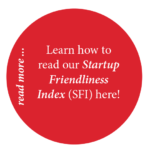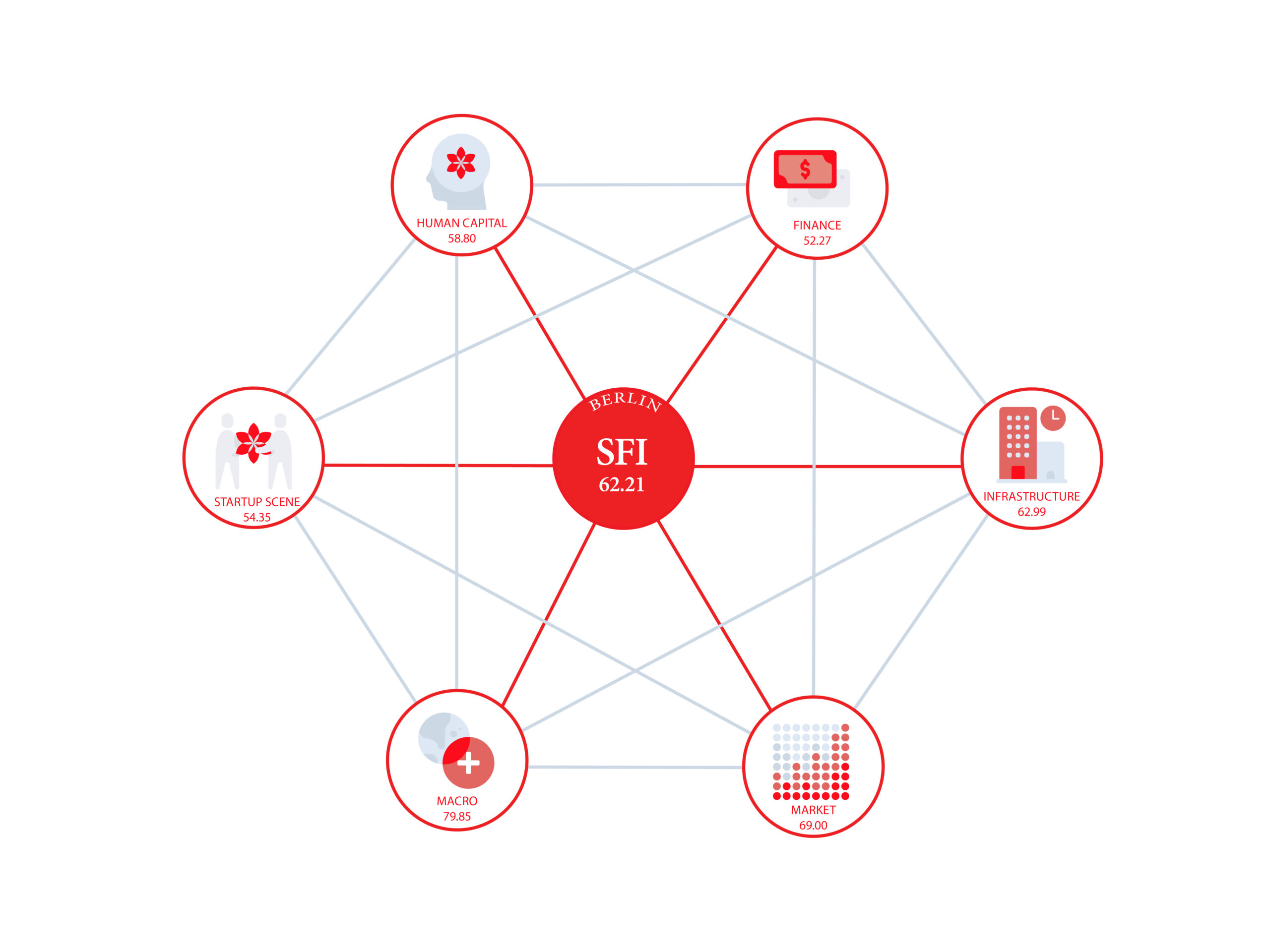
A closer look at Berlin’s startup ecosystem using the SFI
When it comes to the startup scenes of Europe, no list is complete without mentioning Berlin. Once the meeting point for east and west, Berlin has been transformed over 30 years into a hotspot of innovation, community, internationalization and connections. With a large English-speaking and highly educated population, favorable startup policies, a thriving startup scene, and a well-connected economy, expats pour into Berlin from all over the world looking for opportunity and to begin their own ventures.
In addition to the insights of our Startup Friendliness Index (SFI), I was also fortunate to speak with Bernhard Friedrichs, who served as the Vice President of Global Strategic Partnerships for the APAC region for Uberall. During his tenure, he successfully helped Uberall open offices in Southeast Asia and Japan. We’ll be hearing more from Bernhard when we cover German international expansion to Asia in the next section of this edition. But first, we start with a discussion on Germany and Berlin as a potential entry point to the European market for external companies.
Bernhard Friedrichs, who served as the Vice President of Global Strategic Partnerships for the APAC region for Uberall. During his tenure, he successfully helped Uberall open offices in Southeast Asia and Japan. We’ll be hearing more from Bernhard when we cover German international expansion to Asia in the next section of this edition. But first, we start with a discussion on Germany and Berlin as a potential entry point to the European market for external companies.

highlights
- Germany is the largest market in Europe
- For all its support in governance, red tape continues to be a nightmare in Germany
- Berlin’s startup scene largely operates in English, making it friendly to international expats
- The heterogeneity of Europe’s market make it a better jumping off point for international expansion
According to our SFI, Berlin is among the top cities globally in the index, competing with startup powerhouses such as London and Singapore. In the context of its place in the European scale, Berlin excels over London in terms of a much cheaper cost of living and, post-Brexit and a decade of Angela Merkel’s leadership, as the legal and regulatory capital of Europe. For several years, Germany and its capital have been gaining in their reputation for welcoming innovation, strengthening governance, and encouraging entrepreneurship.
Many of the strengths for Germany’s startup ecosystem are quite obvious: a strong economy, high average wealth, a highly connected society and dense populations, strong currency in the Euro, and an overall market size that is twice that of the United States. This can all be said with certainty of Western Europe at large — what, then, really separates Berlin from its fellow European startup ecosystems? In our index, the most comparable ecosystems are London, Barcelona, and Paris.

Berlin’s human capital is on par as a European capital, but has been somewhat sacrificed in the name of laborer protections.
In comparison to many of its peers here in Europe, Berlin is widely known as one of Western Europe’s cheapest capital cities. While the Minimum Wage in Germany is higher than say London and Paris (giving Berlin the lowest score in the index), these two cities have much higher living expenses in comparison. In accordance, companies looking for high-end talent will be expected to pay a higher salary than they might in Berlin. This is reflected in their scores for Average Salary with London at the most expensive, giving it a score of 0.00 (note that a score of 0 reflects that it is the worst in the index), Paris at 19.65, and Berlin at 29.55.
While Berlin has an active university scene and many students, compared directly to universities in London in Paris (such as the London School of Economics, Oxford, and the Sorbonne in Paris), Berlin’s universities lag a bit. Berlin’s strength in human capital most likely comes from its status as a global destination and a large influx of expatriates willing and excited to work in the city’s startup scene.
The scores for Unemployment Rate (86.25), Women’s Participation (70.23), Gender Legal Equality (100.00), and LGBT Legal Equality (100.00) are all about the same between Paris, London and Berlin. The metric for Gender Legal Equality is used to determine if women hold the same legal grounds as men, say to inheritance of estates, etc., by no means implying there is 100% gender equality in any city. The LGBT Legal Equality metric is structured similarly.
However, there is one area where Berlin falters in human capital: Labor Regulation Constraint (60.08). These are representative of a larger trend when analyzing the Berlin startup ecosystem or indeed Germany at large — a daunting amount of bureaucracy.
Germany’s bureaucracy is a two-sided coin. On the one hand, the average worker in Germany benefits from considerable security. As a result of strong collective bargaining and diligent governance, Germany’s labor force is considered well protected (though this never halts the pressure to do even more to protect work and livelihoods). This is surely a massive benefit, and speaking from personal experience as an expat, it is a very strong draw for international talent to flock to Berlin seeking security and quality of life.

However, our index measures how these factors affect business, as is evident from high rates being marked as detrimental from an SFI score perspective. “With stronger social security and more labor protection come some more risks and costs for companies to hire new employees. Compared to the US and UK, Berlin brings more risk, but is still cheaper and less expensive than Paris.” This is certainly not a surprise as the UK and the USA have their roots in a liberal market economies (LME) framework compared to Germany’s foundation from a coordinated market economy (CME). One of the hallmark’s of a CME is the protections for workers at the cost of the flexibility of the market to employer needs. For these reasons, many more firms in Germany are recorded by the World Bank’s Enterprise Survey identifying labor regulations as a major constraint (36.20% of firms who identified this as a problem) when compared to London (21.72%) though not quite as high as Paris (65.86%).
Overall, when accounting for both the strong supply of talent and the high regulatory barriers, Berlin’s human capital is largely on par with London and Paris. What Germany has gained in workers rights has mostly come at a cost to the flexibility of the market. It excels ahead of Barcelona (Human Capital score of 49.11) and is positioned highly overall in our index. Later in this section, we’ll take a look at where Germany’s strong governance can often translate into an overwhelming level of bureaucracy. First, we’ll examine its scores in Finance, Startup Scene, and Infrastructure.
The scores for the Finance and Startup Scene domains in Berlin are adequate, but could improve with steady investment over time. The largest issue in the Infrastructure domain is Germany’s poor internet speeds.
When it comes to Infrastructure, Berlin is well connected and boasts an overall high quality in terms of transport, even for a country with such a rich culture and appreciation for cars. The country ranks highly for its pollution score and quality of electricity, water, and utilities. However, a well known issue in Berlin is the strength of the internet. “It is not a secret that mobile and broadband connections in Germany urgently need an upgrade,” says Bernhard. In 2018, even Economics Minister Peter Altmaier publicly criticized Germany’s internet technology. “It feels like not too much has changed since then. But with the implementation for 5G we can hope for change,” Bernhard finishes. Accordingly, Berlin receives a score of 31.22 for Internet Download Speed — not great for one of the world’s leading economies. Overall, Germany struggles with upgrading digitally due in large part to the nature of its government.
Next, we’ll take a look at the domains of Macro-Political Context and Market, where we’ll see the continuing trends of overwhelming bureaucracy juxtaposed with a very well connected market.

Reducing red tape is the biggest improvement Berlin can make to its startup ecosystem.
Broadly speaking, Germany is a great market to do business in, considering its strength of governance (Democracy Level 96.10, Effective Governance 82.91), steady regulations (Contract Enforcement 80.71, Informality as a Constraint 99.37), and strong currency (Bank Account Penetration 100.00). Everything is close, well connected and there is a high average wealth. Trade agreements are stable and the market size is large and wealthy.
Germany is decentralized in terms of governance and centers for commerce — not confined to one region such as France (where basically all major business is in Paris) or London, which is a strong powerhouse. For Germany, Munich, Berlin, Hamburg, Frankfurt and Stuttgart are all major cities with different strengths and sectors.
When asked how Berlin compares to Paris and London, Bernhard expressed what he felt is a bit of a downswing for Berlin: less investment compared to before, less attention. That being said, Germany’s score for FDI Foreign Net Inflows stands at 37.80, far and away higher than London at 3.78, Barcelona at 10.38, and Paris at 29.17. Germany is the largest market in Europe at the moment, automatically making it quite an attractive choice. And perhaps the most attractive trait for Germany in the SFI is its first place in the index for the Gini Index (100.00). This metric for equality is considered advantageous for entrepreneurship, again speaking to the strong governance of a state, where a strong safety net and low cost of living can often encourage more would-be-entrepreneurs to take the leap.
Perhaps it is a testament to Berlin’s many strengths as a startup ecosystem that my conversation with Bernhard quickly turned to the elephant in the room and by far the hardest hurdle for entrepreneurs (especially international entrepreneurs) to jump: challenging bureaucracy.
“Generally speaking, most markets compared to the incredibly free market of the United States are more risk averse and generally have less money floating around. The UK is similarly a freer market and attracts more capital,” Bernhard begins. “But in terms of what are attractive places to start and grow a company, Germany has so much room to grow.” He points to Germany’s ranking in the World Bank’s Doing Business score for Ease of Doing Business where the country earns the 22nd place. In the sub category of Starting a Business, Germany places a startling 125th place. Clearly, there is some room for improvement.
“In Germany, there is red tape everywhere,” he points out. To his perspective, a lot of these regulations don’t have a net positive effect anymore, are out of date, or are overzealous in their outcome even if they come from a well-meaning place. “It is very pleasing to see that the new government recognizes this and states in its coalition’s contract to reduce bureaucracy. It really is time!”
“When you incorporate a company in Singapore, for instance,” Bernhard says, “you need maybe 15 minutes or at the most two days. For the United States, you don’t even have to be in the USA to incorporate the company. It can be done in 15 minutes, and online, in Estonia, [sic a leader for digital governance]. This is impossible to do today in Germany. In most cases, you need a lawyer, a notary, a tax consultant and patience. It is really good news that the new government finally put it in writing by saying ‘The goal is to enable business to be able to start within 24 hours’”.
There are other governance drawbacks for German startup culture. Bernhard cited German taxes — at about 30%, when the EU average is 21% — which are admittedly high for corporations as well (Corporate Tax Rate score is 18.18 where the lower the score, the worse the tax rate is for entrepreneurs and businesses).
In short, it’s not the easiest place to start a company. And the burden can be exponentially higher for internationals. Given that German is not a widely spoken, global language in the way that English is, German language skills already stand as a huge barrier for internationals. And while the startup scene and even many large companies in Berlin operate entirely in English, the same can not be said for the tax forms, forms of incorporation, registration forms, etc. “Not to forget that these forms are often written in archaic, legalese German language,” adds Bernhard, “so it would be even more difficult for non-native speakers to understand well.” In short, he explains, you need to hire someone to help you, which increases the barrier to becoming an entrepreneur in Germany.

The support needed to grow Berlin’s startup ecosystem
Between Bernhard, an entrepreneur, and myself, an expat in Berlin, the discussion of Germany’s bureaucracy was a great bonding moment for us. Moving on, we pivoted to talk a bit more about the solutions and innovations coming out of these challenges.
We started with the number of tech solutions that are cropping up to help people and firms overcome the mountain of regulations.
“For instance, I’ve seen some companies that offer entrepreneurs a bank account that already comes with a tax consultant to help navigate the initial steps you need to get started as an entrepreneur,” Bernhard begins. “There are also startups that specialize in offering fully digital solutions that completely cut out the very burdens we mentioned.” A great example is the FinTech company, N26, which is far easier for expats to register for in comparison to some legacy Germany banks like Deutsche Bank.
“The biggest thing we can do to help entrepreneurs, especially international ones, is assist them in navigating these issues. Someone who can explain to you what type of legal entity you need (each kind requires different steps), someone to help you register at the Chamber of Commerce and the Finance office. I’m glad to see more political initiatives that have been announced recently that will definitely help to make Germany an even more competitive startup hub.” Programs like enpact’s Landing Pad, for example, are designed to do exactly that.
Beyond the bureaucracy, of course, there are questions about product and market that every company, no matter where they go, will need. Berlin could adapt even more to help entrepreneurs figure out how to fit new innovations into the German market rather than resisting new innovations entering the market. There are numerous startups or products that have faltered in Germany for reasons such as violating personal data laws or being ‘too disruptive’, like Airbnb and Uber. While the regulation of these disruptive companies is largely recognized as crucial, there is an argument to be made to work proactively with the firms to serve the market rather than locking them out.
I finished our interview by asking Bernhard if there are specific barriers for startups, founders, or firms coming from the APAC region. Of course, there is no easy answer and it depends greatly on the individual country, culture and person. Some countries, like Japan, have a similar regulatory framework. Some have more cultural connections, such as Vietnam. But, as is the usual culprit, there can be a large gap in culture and in business culture.
Overall, Berlin is still a great place to start or grow a business: it is cheap, centrally located, it is well governed and protected, open, international, and “as a city, it’s very well positioned to be a future success story,” concludes Bernhard. As a multicultural, capital European city, it has so much to offer and attracts talent from all over the world.
In the rest of this edition, we explore what it’s like to expand to Berlin from Asia, the importance of well-being in the startup ecosystem and Berlin’s competitive advantage there, and how Berlin’s LGBT-reputation affects its startup culture. From there, we take a look at the opposite side: outbound startups from Berlin to Asia.
In the rest of this edition, we explore what it’s like to expand to Berlin from Asia, the importance of well-being in the startup ecosystem and Berlin’s competitive advantage there, and how Berlin’s LGBT-reputation affects its startup culture. From there, we take a look at the opposite side: outbound startups from Berlin to Asia.





